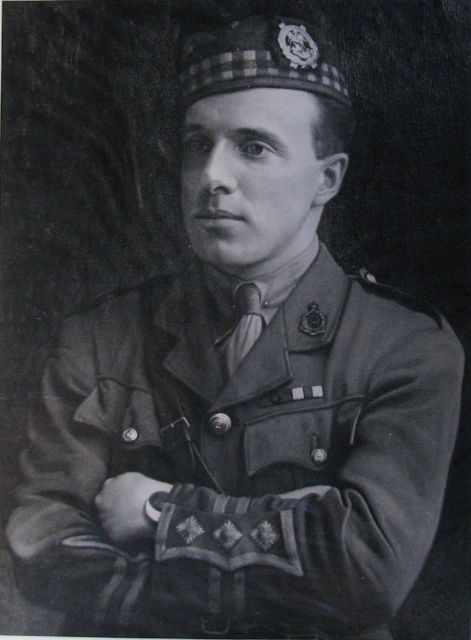Captain Noel Chavasse VC and Bar MC RAMC
Captain Noel Chavasse VC and Bar MC RAMC
Ian Riley, Liverpool Scottish Regimental Museum Trust
Noel Godfrey Chavasse died on 4th August 1917 after being wounded in his Regimental Aid Post early on 2nd August during the Battle of Pilckem Ridge. He was the only man to win the Victoria Cross twice in the First World War and one of only three men (two of them RAMC officers) to be awarded a bar to a VC. He was born in Oxford in 1884, one of twins into a family distinguished in medicine and the Church of England: his father was the Bishop of Liverpool and his twin, Christopher became Bishop of Rochester. In 1914 he was registrar to the famous orthopaedic surgeon, Sir Robert Jones, at the Southern Hospital in Liverpool, having competed in the 1908 Olympics. He was mobilised with his Territorial Force unit, 10th (Scottish) Battalion, The King’s (Liverpool Regiment), known as the Liverpool Scottish. Already their Medical Officer, he went to France and Flanders in November 1914.
Chavasse made his mark through his outstanding moral (as well as physical) courage with his determination to look after the men both in and out of the trenches.
December 1915 (Adjutant’s Diary): The Doctor’s “Soldiers’ Home” is beginning to be appreciated by the men. Tea is served nightly from 8-9pm, the Home’s library is increasing daily.
18th April 1916: (Herd Diary): The Doctor always had an eye to improving any quarters we happened to be in; he would improvise a bathroom by placing cow-tubs in some broken down shed and … he would fix up a stove in order to provide hot cocoa for the sick.
Regimental History: Another excellent institution started by Captain Chavasse [in 1916], [himself putting up the money] was a dry canteen. Corporal W. Forbes, who had charge of it, toured tthe trenches every morning and booked the orders. He then returned to the rear, obtained the goods and … the men were able to get a number of tasty additions to their rations, such as cocoa, condensed milk and chocolate.
His Military Cross, won at Hooge outside Ypres in June 1915. It might have been something higher if the original recommendation had not been lost. In the words of Sam Moulton, groom to ‘Doris’, the Doctor’s horse:
When [evening, 17th June] the Doctor & S.Bs arrived and they all looked done in. The Doctor had been in the firing line since the 15th & after the Charge had been made on the 16th. (early morning) he had been looking for and attending the wounded in front of the trenches. He … examined every 'Jack Johnson' hole and would not give in till he was satisfied everyone was accounted for.
His two Victoria Crosses were earned with the 55th (West Lancashire) Division for his work at Guillemont (8/9th August 1916) and near the village of Wieltje on Pilckem Ridge outside Ypres (31st July – 2nd August 1917). At Guillemont
He tended the wounded in the open all day, under heavy fire, frequently in view of the enemy … searching for wounded in No-Man’s-Land for four hours at night. The following day he went under heavy shell fire and carried an urgent case for 500 yards into safety, being wounded and that night … rescued three wounded men from a shell hole twenty-five yards from the enemy … though fired on by bombs and machine guns. Altogether he saved the lives of some twenty badly wounded men, beside the ordinary cases which passed through his hands. (N.B. Citation condensed and paraphrased)
At Pilckem Ridge:
Though severely wounded early in the action whilst carrying a wounded soldier to the Dressing Station, Captain Chavasse refused to leave his post, and for two days went out repeatedly under heavy fire to reach the wounded in addition to his normal duties. Worn with fatigue and lack of food and faint with his wound, he assisted to carry in a number of badly wounded men, over heavy and difficult ground. By his extraordinary energy and inspiring example, he [and his stretcher bearers] rescued many wounded who would have succumbed in the appalling weather. (N.B. Citation condensed and paraphrased)
Always known as the ‘Doc’, his heroism was not that of a single moment sparked by the heat of battle but courage, the quality that guarantees all others, of a much deeper kind. It was a cool and persistent courage over hours and days, rooted both in his faith and an unbending devotion to the spiritual, moral and physical welfare of his fellows whether in identifying and succouring those wavering in the face of danger, whether tracking down medicines difficult to find, running his own Ascension Day service in a front line post that the Padre could not or would not reach or taking endless trouble to ensure that feet stayed healthy and socks were dry.
Noel Chavasse – a enduring example of self-sacrifice and supreme courage, both moral and physical.
An long article on Noel Chavasse at the Battle of Pilckem Ridge and recent research on the location of his Regimental Aid Post/Dressing Station will be found Here
Previous page: Chavasse's Dinner
Next page: A Hundred Years Ago
